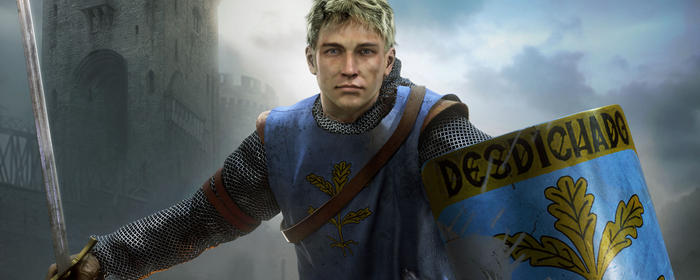Jason Recommends: Crusader Kings II

I’d be remiss if I didn’t take a moment to tell you about my current addiction: a new strategy game from Paradox Interactive, Crusader Kings II.
Longtime Readers will already be aware of my general love for Paradox titles; see here and here for examples. But I’m not an uncritical fanboy — see here for some pointed words about the latest iteration of Paradox’s flagship series, Europa Universalis. So hopefully you won’t take it as inevitable when I tell you that Crusader Kings II may be Paradox’s finest product to date.
Paradox specializes in so-called “grand strategy” games — games where you command entire nations and empires, rather than individual units on a battlefield. CK2 continues this tradition, but like the original Crusader Kings, it brings an interesting twist: rather than controlling a nation, you control a family. You start the game by choosing a historical family from medieval Europe, and your task is to guide your family to as great a height of power as you can, pulling more and more territories under your feudal authority, without getting wiped out of the pages of history by another clan striving for the same prizes you seek.
CK2 is a game of personalities. You start off controlling whomever happens to be the head of the family you chose to play in the year you chose to start. That person may be a great leader, or a cruel tyrant, or a cringing coward. Every character in CK2 has a range of attributes — things like “brave,” or “shy,” or “clubfooted” — and these attributes define both their chances of success at the goals they set out to achieve, and how other characters respond to them as they go about trying to achieve them.
But the importance of attributes goes beyond the ones attached to the character you play at the start, because as the years in the game tick by, at some point, that character is going to die. It may be a glorious death on the battlefield, or a quiet death at home in bed. But death always comes — and when it does, your realm passes to whomever in your family is next in the line of succession. (Usually that’s your oldest son, but it’s possible for women to inherit titles too in some circumstances.) If that person is strong and capable, the transfer may happen quietly; if they are stupid, or widely disliked, or a heretic, say, other characters — even members of their own family! — may decide to challenge them, and that can lead to full-out Game of Thrones-style civil wars. So making sure that your heirs are as good as they can possibly be becomes a big part of the strategy of the game; who you marry yourself, whom you marry your children off to, and how you choose to raise them, can be every bit as important as which armies you push where on the map.
And since the game is shaped so strongly by dynamics between characters, and those characters come out different each time you play based on who pairs off with whom when, each game is new and different. It’s a fascinating and fresh approach to strategy gaming.
The original Crusader Kings played in much the same way, but was hobbled by an unintuitive interface and some questionable design choices. CK2, happily, fixes all those problems in grand style; the information you need is always close at hand, and all the different components of the game design hold together beautifully. (With one possible exception — the tech research tree seems pretty useless. CK2 isn’t a game like Civilization where you’ll win by discovering a great new technology before anyone else. But given that the setting is the technologically-static Middle Ages, that doesn’t hurt the game particularly.)
Oh, and since I’m on record griping about how terrible the maps in Paradox games have become since they moved to a 3D engine, it’s worth noting that the game map in CK2 is gorgeous. It’s the first Paradox game in years where I found myself scrolling around the map just to admire the detail. That’s a welcome return to form for a company whose original games were known for their attention to design details.
Anyway, don’t take my word for it. Read Rock Paper Shotgun’s review, or Kotaku’s, or Destructoid’s. This game is really something special.
Want to try it for yourself? It’s available for purchase now (from Gamersgate and Steam, among other places), and there’s a free demo you can download that lets you play for twenty in-game years to get a taste for how it works. If you like strategy games at all, or are even just tempted by the idea of playing a game that’s half wargame and half soap opera, take some time this weekend and give it a look.

Comments
Erin
March 30, 2012
11:43 am
So, do I get to borrow it?